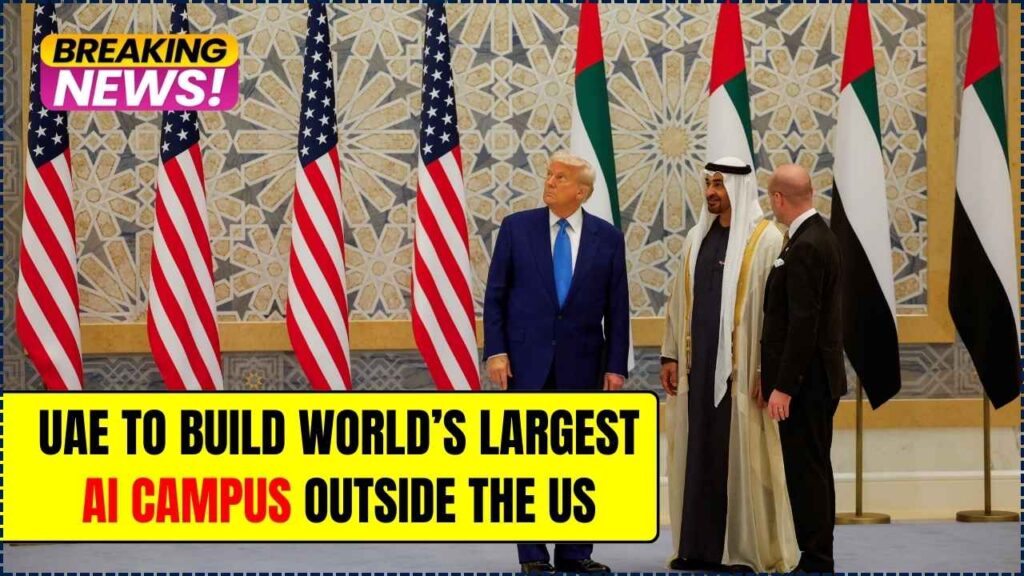UAE to Build World’s Largest AI Campus Outside the US: In a bold move poised to reshape the global tech landscape, the United Arab Emirates (UAE) has announced plans to construct the world’s largest AI campus outside of the United States. This visionary project, backed by former U.S. President Donald Trump and a coalition of American and Emirati firms, aims to position the UAE as a top-tier global hub for artificial intelligence research, data infrastructure, and next-generation innovation.

The announcement came during a high-profile summit in Abu Dhabi where leaders from both nations unveiled the ambitious blueprint. At the heart of this venture lies an integrated 10-square-mile AI campus powered by a 5-gigawatt data infrastructure and backed by G42, a UAE state-backed technology group. The initiative is part of a $200 billion bilateral technology and energy partnership, marking one of the most significant international tech collaborations in recent history.
UAE to Build World’s Largest AI Campus Outside the US
| Feature | Details |
|---|---|
| Project Name | UAE AI Super Campus (official name pending) |
| Location | Abu Dhabi, UAE |
| Total Area | 10 square miles (~25.9 square kilometers) |
| Power Capacity | 5 gigawatts (for AI data centers) |
| Lead Developer | G42, a state-supported Emirati technology firm |
| Key U.S. Role | Infrastructure, cloud computing, and chip supply |
| Nvidia Chip Imports | 500,000+ Nvidia AI chips annually from 2025 |
| Strategic Purpose | Position UAE as global AI leader; diversify oil-centric economy |
| Announced By | Former President Donald Trump and UAE Crown Prince |
| Official Source | U.S. Commerce Department |
The UAE’s AI campus initiative is more than a tech announcement—it’s a declaration of intent, capability, and ambition. With robust backing from both Emirati and American partners, and a global outlook, the project may well redefine how the world develops, shares, and governs artificial intelligence.
By building infrastructure at unprecedented scale, nurturing talent, and fostering international collaboration, the UAE is carving out a prominent role in the digital era. As this project unfolds, it promises to bring far-reaching opportunities and set new standards for AI-driven ecosystems worldwide.
Why the UAE to Build World’s Largest AI Campus Outside the US
The UAE’s mega-campus announcement is more than just a flashy investment—it’s a strategic pivot toward long-term economic transformation. With oil revenues still dominant but finite, the Emirati leadership has consistently pushed for diversification, especially in technology, fintech, clean energy, and AI.
From Petro-State to Tech Powerhouse
Over the past decade, the UAE has invested heavily in smart cities, blockchain integration, and data infrastructure. The AI campus is a logical extension of its digital ambitions, ensuring it stays competitive in an increasingly data-driven world.
“The world doesn’t run on oil anymore—it runs on data,” noted Omar Al Olama, UAE Minister of State for AI.
The Role of the United States in the AI Campus
The UAE’s AI aspirations are being closely supported by U.S.-based technology giants, many of which have formal agreements in place to provide:
- Cloud infrastructure and services
- AI model deployment tools
- Cybersecurity protocols and compliance layers
- Talent exchange and training programs
The Trump-era lobbying for pro-AI and pro-partnership policies with Gulf nations is credited for laying the groundwork. This project is the first major AI infrastructure export partnership post-2025 policy reforms.
Technical Overview – Inside the AI Campus Blueprint
Campus Layout and Facilities
The 10-square-mile campus will feature:
- Multi-phase data centers (initially 5GW scalable to 8GW)
- AI research and innovation hubs
- Education and talent development centers
- Residential and recreational facilities for over 30,000 tech workers
Energy and Sustainability
The project includes a green-energy integration plan, utilizing solar arrays and carbon-neutral cooling systems, aiming to be net-zero by 2030. Battery storage and hydrogen backup are part of the redundancy systems.
AI Applications to Be Developed
Research and development efforts at the campus will target:
- Autonomous transport systems
- Medical diagnostics and drug discovery
- Climate modeling and sustainability solutions
- Multilingual AI and Arabic LLMs
- Cybersecurity and quantum simulation
Strategic Impact and Global Implications
Redrawing the AI Innovation Map
Traditionally, AI superclusters have centered around Silicon Valley, Seattle, and Beijing. The Abu Dhabi campus puts the Middle East on the global map for AI research and infrastructure.
Supply Chain Evolution
The 500,000-chip annual agreement with Nvidia underscores a shift in chip logistics, marking the UAE as a strategic node in the global AI semiconductor ecosystem.
“This is more than a regional project. It’s a rebalancing of where innovation happens,” said an official at the U.S. Department of Commerce.
Trump’s Involvement and the Diplomatic Context
While no longer in office, Donald Trump remains a vocal proponent of energy-tech partnerships. His presence at the announcement emphasized:
- Continued private-sector ties
- Gulf investment opportunities for American firms
- Broader cooperation in tech, defense, and digital finance
Trump’s Stargate Global Fund, backed by Gulf sovereign wealth and Silicon Valley capital, is reportedly co-investing in associated ventures like AI chip fabs and satellite connectivity solutions for remote regions.
Challenges and Ethical Considerations
Data Governance and Regulation
There are concerns about data localization laws, transparency standards, and ethics oversight. Independent watchdogs are calling for:
- Public reporting on AI research practices
- Algorithmic bias audits
- Interoperable privacy laws between the U.S. and UAE
Geopolitical Friction
With China also investing in Middle Eastern AI infrastructure, the UAE must walk a tightrope in maintaining neutrality while deepening Western ties.
Experts warn of a potential “AI Cold War”, where infrastructure becomes the new battleground for influence.
Who Benefits from the AI Super Campus?
For Developers and Startups
- Access to world-class compute and GPU clusters
- Sandboxed environments for testing AI models
- Fast-track licensing and grant programs
For Students and Researchers
- New fellowships and PhD programs in AI and quantum computing
- Cross-border academic exchange programs with MIT, Stanford, and NYU Abu Dhabi
For Corporates and Governments
- Tailored enterprise AI deployments
- Sector-specific innovation labs (healthcare, finance, logistics)
- Scalable infrastructure for digital transformation
FAQs On UAE to Build World’s Largest AI Campus Outside the US
Q1: When will the UAE AI campus be completed?
A: Phase 1 is scheduled for completion by late 2026, with full capacity projected by 2028.
Q2: Can non-UAE companies lease space or participate?
A: Yes, the campus will offer co-location, cloud partnerships, and licensing for global tech firms.
Q3: Will the campus support AI safety research?
A: Yes. Dedicated safety labs and ethics boards will evaluate high-risk use cases and ensure compliance.
Q4: How does the UAE plan to train AI talent?
A: Through scholarships, university partnerships, and a new AI University located on campus grounds.
Q5: Will AI models developed in the UAE be open source?
A: Some models will be released under open licenses to support global collaboration.






